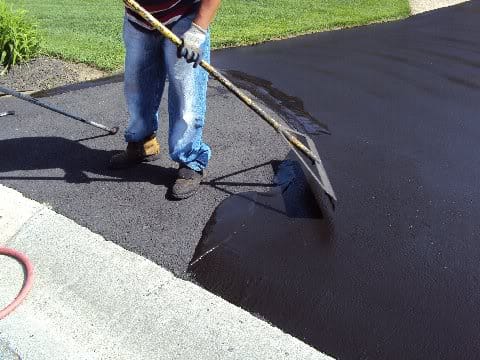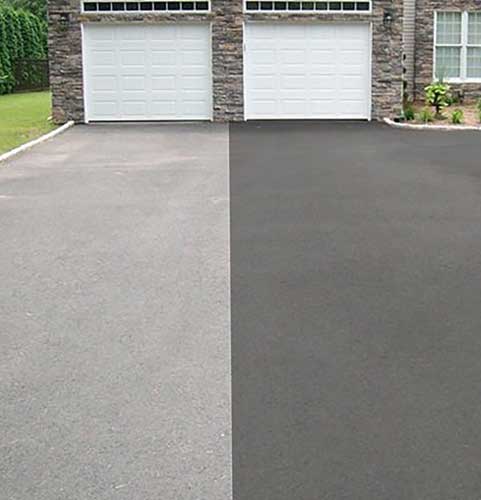Elevate Commercial Allure: Hot Mix Asphalt Sealing for Angled Parking Lots
Elevate Commercial Allure: Hot Mix Asphalt Sealing for Angled Parking Lots
Blog Article
Warm Mix Asphalt: A Lasting Remedy for Sidewalk
Warm Mix Asphalt (HMA) has actually emerged as a leading lasting option for pavement remedies, providing a myriad of cutting-edge technologies and ecological benefits. As the need for green building practices expands, checking out the subtleties of HMA's sustainability can supply valuable understandings into the future of sidewalk services.
Ecological Benefits of Hot Mix Asphalt

Additionally, Warm Mix Asphalt assists to mitigate metropolitan warmth island results. Its dark shade absorbs sunshine, decreasing the quantity of warmth showed back right into the atmosphere compared to lighter-colored sidewalks. This can lower ambient temperature levels in metropolitan locations, decreasing the demand for cooling and ultimately reducing energy intake.
Additionally, Warm Mix Asphalt adds to improved stormwater management. Its porous nature enables water to recharge and infiltrate the pavement groundwater materials, lowering drainage and the threat of flooding. These ecological advantages make Warm Mix Asphalt a sustainable option for leading highways and roads.
Power Performance in HMA Manufacturing
Is power effectiveness an important variable in the production of Hot Mix Asphalt (HMA)? Power plays a considerable role in the production of HMA, influencing both expense and environmental sustainability. One vital element of energy effectiveness in HMA production is the usage of warm mix asphalt (WMA) innovations.
Moreover, improvements in plant innovations have led to more energy-efficient HMA manufacturing procedures. By optimizing power use in HMA manufacturing, the market can lower its carbon footprint while preserving high-grade pavement materials.
Recyclability of Hot Mix Asphalt
The recyclability of Hot Mix Asphalt (HMA) is a crucial aspect of its sustainability and long-term environmental impact. HMA is one of the most recycled materials in the USA, with over 100 million bunches of reclaimed asphalt sidewalk (RAP) being reused yearly in new sidewalk building and construction. Reusing HMA provides numerous environmental benefits, such as minimizing the requirement for virgin products, decreasing redirected here power consumption during production, and reducing the amount of waste sent to garbage dumps.
The process of reusing HMA includes crushing the existing sidewalk, crushing it into smaller sized items, and blending it with brand-new accumulation and asphalt binder to develop a recycled mix. Overall, the recyclability of HMA plays a significant function in promoting sustainable practices within the pavement industry.

Long-Term Efficiency of HMA
Asphalt sidewalks demonstrate durability and strength over a prolonged period, mirroring the lasting performance of Warm Mix Asphalt (HMA) Furthermore, developments in HMA modern technology, such as the usage of polymer-modified binders and warm mix asphalt, have better improved the toughness and durability of HMA pavements. By prioritizing high quality construction and upkeep practices, HMA continues to prove itself as a affordable and lasting remedy for long-lasting sidewalk framework.

HMA: Sturdiness and Sustainability
Demonstrating both resilience and sustainability, Hot Mix Asphalt (HMA) has actually become a keystone in the building and construction of resilient sidewalk facilities - regrading. HMA's sturdiness comes from its capacity to stand up to hefty loads, extreme weather, and high web traffic volumes, making it a trusted selection for roads, freeways, and flight terminal runways. The make-up click this link of HMA, which typically helpful resources consists of aggregates, binder, and filler, plays an important role in boosting its durability and resistance to deterioration
Additionally, HMA's sustainability depends on its recyclability and energy-efficient manufacturing process. The capacity to recycle recovered asphalt pavement (RAP) in new HMA blends decreases the need for virgin products and lessens the ecological impact of pavement construction and maintenance. Furthermore, the power efficiency of creating HMA depends on its lower mixing temperature levels contrasted to other pavement materials, leading to lowered energy usage and greenhouse gas emissions.
Verdict
In final thought, warm mix asphalt (HMA) uses a sustainable service for sidewalk with its environmentally friendly characteristics. HMA's recyclability, energy efficiency in manufacturing, and lasting resilience make it an environment-friendly choice for roadway building and construction.
HMA is one of the most recycled products in the United States, with over 100 million tons of redeemed asphalt sidewalk (RAP) being recycled yearly in brand-new pavement building and construction.The process of reusing HMA involves grating the existing pavement, squashing it right into smaller items, and mixing it with new accumulation and asphalt binder to create a recycled mix.Asphalt sidewalks show longevity and resilience over a prolonged duration, reflecting the lasting efficiency of Hot Mix Asphalt (HMA) Furthermore, improvements in HMA technology, such as the usage of polymer-modified binders and warm mix asphalt, have additionally improved the longevity and durability of HMA sidewalks. The capacity to recycle recovered asphalt pavement (RAP) in new HMA combinations minimizes the need for virgin materials and decreases the environmental influence of sidewalk building and construction and upkeep.
Report this page